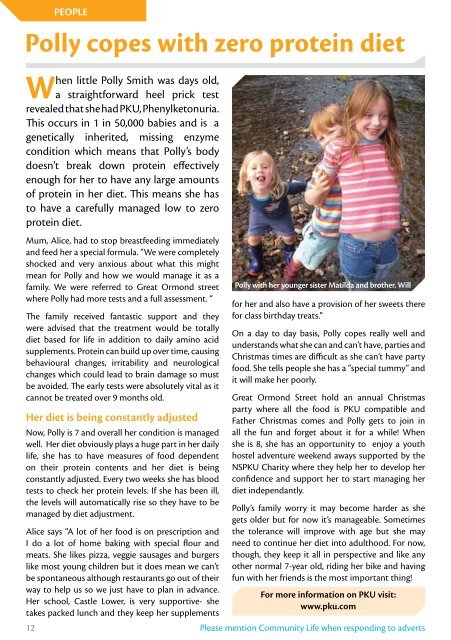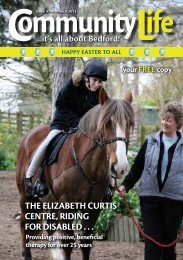p17i58i2rle6i1bka12vm1aed1fqb1.pdf
- No tags were found...
You also want an ePaper? Increase the reach of your titles
YUMPU automatically turns print PDFs into web optimized ePapers that Google loves.
people<br />
Polly copes with zero protein diet<br />
When little Polly Smith was days old,<br />
a straightforward heel prick test<br />
revealed that she had PKU, Phenylketonuria.<br />
This occurs in 1 in 50,000 babies and is a<br />
genetically inherited, missing enzyme<br />
condition which means that Polly’s body<br />
doesn’t break down protein effectively<br />
enough for her to have any large amounts<br />
of protein in her diet. This means she has<br />
to have a carefully managed low to zero<br />
protein diet.<br />
Mum, Alice, had to stop breastfeeding immediately<br />
and feed her a special formula. “We were completely<br />
shocked and very anxious about what this might<br />
mean for Polly and how we would manage it as a<br />
family. We were referred to Great Ormond street<br />
where Polly had more tests and a full assessment. “<br />
The family received fantastic support and they<br />
were advised that the treatment would be totally<br />
diet based for life in addition to daily amino acid<br />
supplements. Protein can build up over time, causing<br />
behavioural changes, irritability and neurological<br />
changes which could lead to brain damage so must<br />
be avoided. The early tests were absolutely vital as it<br />
cannot be treated over 9 months old.<br />
her diet is being constantly adjusted<br />
Now, Polly is 7 and overall her condition is managed<br />
well. Her diet obviously plays a huge part in her daily<br />
life, she has to have measures of food dependent<br />
on their protein contents and her diet is being<br />
constantly adjusted. Every two weeks she has blood<br />
tests to check her protein levels. If she has been ill,<br />
the levels will automatically rise so they have to be<br />
managed by diet adjustment.<br />
Alice says “A lot of her food is on prescription and<br />
I do a lot of home baking with special flour and<br />
meats. She likes pizza, veggie sausages and burgers<br />
like most young children but it does mean we can’t<br />
be spontaneous although restaurants go out of their<br />
way to help us so we just have to plan in advance.<br />
Her school, Castle Lower, is very supportive- she<br />
takes packed lunch and they keep her supplements<br />
polly with her younger sister Matilda and brother, Will<br />
for her and also have a provision of her sweets there<br />
for class birthday treats.”<br />
On a day to day basis, Polly copes really well and<br />
understands what she can and can’t have, parties and<br />
Christmas times are difficult as she can’t have party<br />
food. She tells people she has a “special tummy” and<br />
it will make her poorly.<br />
Great Ormond Street hold an annual Christmas<br />
party where all the food is PKU compatible and<br />
Father Christmas comes and Polly gets to join in<br />
all the fun and forget about it for a while! When<br />
she is 8, she has an opportunity to enjoy a youth<br />
hostel adventure weekend aways supported by the<br />
NSPKU Charity where they help her to develop her<br />
confidence and support her to start managing her<br />
diet independantly.<br />
Polly’s family worry it may become harder as she<br />
gets older but for now it’s manageable. Sometimes<br />
the tolerance will improve with age but she may<br />
need to continue her diet into adulthood. For now,<br />
though, they keep it all in perspective and like any<br />
other normal 7-year old, riding her bike and having<br />
fun with her friends is the most important thing!<br />
for more information on pKU visit:<br />
www.pku.com<br />
12 Please mention Community Life when responding to adverts









